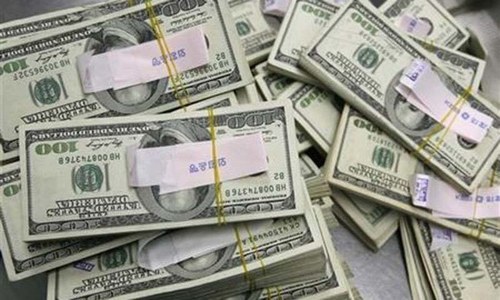WASHINGTON: A US State Department report released on Friday labelled the Altaf Khanani group as a money laundering organisation and accused it of laundering billions of dollars for organised crime and terrorist outfits.
US Assistant Secretary of State for Bureau of International Narcotics and Law Enforcement Affairs William R. Brownfield told a briefing in Washington that the State Department had delivered its 32nd International Narcotics Control Strategy Report to Congress on Wednesday. “It is, however, the first time that we are discussing and rolling this report out before the media in nine years,” he added.
In its section on Pakistan, the report notes: “The Altaf Khanani money laundering organisation (Khanani MLO) is based in Pakistan. The group, which was designated a transnational organised crime group by the United States in November 2015, facilitates illicit money movement between, among others, Pakistan, the United Arab Emirates (UAE), United States, UK, Canada, and Australia.”
Also read: Javed Khanani dies after falling from building in Karachi, say police
The group “is responsible for laundering billions of dollars in organised crime proceeds annually. The Khanani MLO offers money laundering services to a diverse clientele, including Chinese, Colombian, and Mexican organised crime groups and individuals associated with designated terrorist organisations”, the report adds.
It describes Pakistan as strategically located country at the nexus of south, central and western Asia, with a coastline along the Arabian Sea. The report notes that Pakistan’s porous borders with Afghanistan, Iran and China facilitate the smuggling of narcotics and contraband to overseas markets.
“The country suffers from financial crimes associated with tax evasion, fraud, corruption, trade in counterfeit goods, contraband smuggling, narcotics trafficking, human smuggling/trafficking, terrorism and terrorist financing,” the report points out.
“There is a substantial demand for money laundering and illicit financial services due to the country’s black market economy and challenging security environment.”
The report notes that money laundering in Pakistan affects both the formal and informal financial systems. Pakistan does not have firm control of its borders, which facilitates the flow of illicit goods and monies into and out of Pakistan.
The report, however, acknowledges that most Pakistanis living abroad use legal channels for sending money home. From January to December 2016, the Pakistani diaspora remitted $19.7 billion back to Pakistan via the formal banking sector, up by 2.3 per cent from 2015.
The report notes that while it is illegal to operate a hawala without a licence in Pakistan, the practice remains prevalent because of poor ongoing supervision efforts and a lack of penalties levied against illegally operating businesses. “Unlicensed hawala/hundi operators are also common throughout the broader region and are widely used to transfer and launder illicit money through neighbouring countries,” the report adds.
Common methods for transferring illicit funds include fraudulent trade invoicing, unlicensed hundis and hawalas and bulk cash smuggling.
The report says that criminals exploit import/export firms, front businesses and the charitable sector to carry out their activities. Pakistan’s real estate sector is another common money laundering vehicle, since real estate transactions tend to be poorly documented and cash-based, it adds.
The report notes that in January 2015, Pakistan launched the National Action Plan (NAP), addressing primarily counter-terrorist financing. The government’s implementation of the NAP “has yielded mixed results, which is in part due to the lack of institutional capacity as well as political will,” the report adds.
“Unlicensed hawaladars continue to operate illegally throughout
Pakistan, particularly in Peshawar and Karachi, though under the NAP Pakistan has reportedly been pursuing illegal hawala/hundi dealers and exchange houses.”
The report says that Pakistan’s Federal Investigation Agency, which is responsible for investigating money laundering cases, lacks the capacity to pursue complicated financial investigations.
Last year, Altaf Khanani pleaded guilty to a money laundering charge before a US court and signed a plea agreement on Oct 27. Khanani was arrested in September last year following a sting operation by the US Drug Enforcement Administration, and has been in jail ever since. He was indicted in the US District Court of the Southern District of Florida on 14 counts of money laundering in June 2015.
Khanani was among the four men the United States blacklisted in October for purported ties to an organisation accused of laundering money for drug traffickers and Chinese, Colombian and Mexican crime groups. Among them was his son Obaid Khanani.
In a statement issued then, the US Department of Treasury said that Obaid Khanani, 29, continued to help lead his father’s money laundering organisation after the arrest. Another man on the list, Hozaifa Khanani, also 29, was Altaf Khanani’s nephew and was involved in real estate investments on behalf of his uncle’s organisation, the Treasury Department added.
It said Mohammad Javed Khanani, Altaf Khanani’s brother, was “heavily involved in laundering criminal proceeds via money service businesses”.
Javed Khanani, a director of Khanani and Kalia International (KKI) money changers, died in December 2016 after reportedly falling from an under-construction building in Karachi.
A fourth man, Atif Polani, helped move funds on behalf of Khanani’s organisation.
Published in Dawn, March 4th, 2017













































